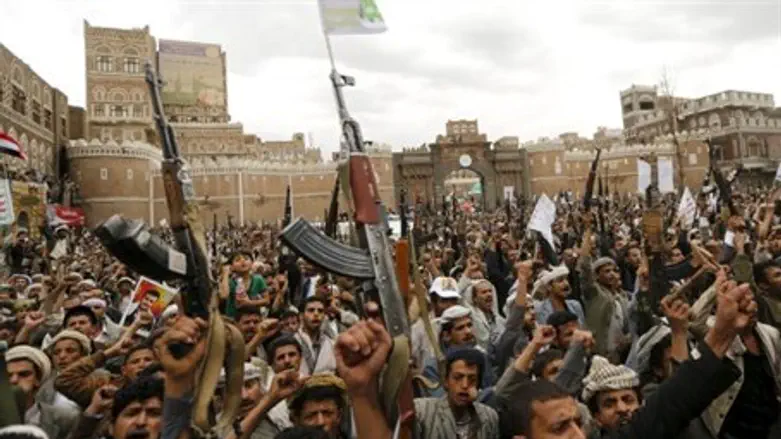
Developments in Yemen are further proof of the US and the Arab world's inability to assert themselves, Dr. Dan Schueftan, a Middle East expert at the University of Haifa, stated Tuesday morning.
"Yemen is disintegrating," Schueftan stated, in an interview with Arutz Sheva. "This phenomenon has taken place in Iraq, Syria and Libya. This is a phenomenon that emphasizes the weakness of the region's societies." He added that Egypt may be the only Middle Eastern country which has been stable enough, over time, to be seen as a state with a permanent presence.
Schueftan also related to Iranian and Saudi Arabian involvement in Yemen.
"In Yemen, senior officials, aided by the Revolutionary Guards in Iran, are trying to take over a strategic position that has great importance to the whole world," he explained.
"Yemen sits at the mouth of the Mandeb strait, through which passes a significant portion of the world's oil, from the Persian Gulf through the Suez Canal into the Mediterranean Sea and on the way to Europe."
Yemen also neighbors Saudi Arabia, he noted, and the Sunni-Shi'ite struggle playing out on its soil is a means of Iran expanding its territory.
In terms of Israel, he said, the important thing is for Israel to coordinate with other regional powers to ward off the Iranian threat. Egypt, Turkey, Saudi Arabia, Jordan, and Morocco are on Israel's side in this issue, he added.
The real issues stem from American foreign policy, which see the division of the Arab world as "disappointing."
"American policy is partly confused and partly guided by the strangest considerations," he noted. "Its policy can no longer be trusted, and therefore Arab states need to take matters into their own hands."
Schueftan added that Washington is guilty of support without leadership, creating a power vacuum.
"For the first time, Arab countries are taking a leadership role, and for the first time they are talking about creating a uniting force of Arab countries to be guided by the main Sunni states."
While the Iranian threat to Yemen is "very bad for Israel" in the short term, he said, the Arab response is "very encouraging in terms of Israel's regional considerations."
Schueftan noted that no one in Israel wants to see Israel itself involved with the present unrest, but estimates that it could happen, due to Israel's relationship with Egypt and less public understandings with Saudi Arabia.
"Overall this is a good development from Israel's perspective," he concluded, but warned against predictions. "Placing 'stabilization' and 'Arab countries' in the same sentence is a syntactical error," he added wryly.